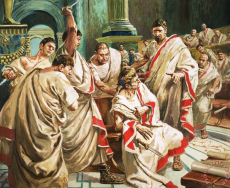
A more accurate motive for a majority of the assassins was to remove a challenge to their personal prestige. In his attempts to gain the support of the masses Caesar made distributions of 100 denari to all citizens and rewarded soldiers even more greatly with 5000 each and double to Centurions. This angered the nobility because the Republic, despite its name, was not at all a public affair and had always held several leading noble families at its head. These families fought bitterly amongst one another for gloria and dignitas and it was ludicrous to them to see the state treasury given to the illiterate and largely irrelevant (in their eyes) masses and furthermore, they worried that Caesar was rallying too much popular support through his actions. Caesar also granted many of the senate members who had rallied against him high ranking positions within the cursus honorum, gifting a praetorship to both Brutus and Cassius. However, having increased the number of Praetors and Caesar himself proclaimed dictator for life, diminished virtually all power from the praetors, further angering the young roman nobles. Therefore, it is not unreasonable to suggest that they had reason to assassinate him in order to remove these hindrances to their own prowess and with many roman nobles all desiring Gloria it is not surprising that so many joined Brutus and Cassius. Indeed writing less than two months after the death of Caesar, Cicero said to Cassius that he and Brutus may have seen to the removal of a tyrant for their dislike of his rule but that the tyranny would nevertheless continue. Cicero understood that the murder would pave the way for new competition and was not an adequate solution to preserving the republic. Crawford echoes this, stating that there was little difference between the murderers of Caesar and those defending his actions, that all were high ranking members of the oligarchy and all fought for supreme power.
Sure enough the most devastating of all the Republic’s civil wars erupted after Caesar’s death so perhaps one might argue, as does Ronald Syme, that in fact Caesar was more conservative than he is portrayed by most scholars and helped hold together the oligarchy. With the constant power struggle in the Republic between the nobility it is no surprise that so many prominent and powerful figures from the Gracchi through to Caesar were murdered, so perhaps an autocrat was actually in the best interests of the republic. We know also from Cicero’s letters that Cassius was some twenty years his younger and had held the position of quaestor, defeated a Parthian assault in Syria after Crassus was defeated at Carrhae and had held command of Pompey’s fleet prior to Caesar’s dictatorship. It seems reasonable therefore to confidently conclude that he was as interested in removing the competition by assassinating Caesar as he was of liberating the Republic, perhaps even using such grand ideals as Brutus held as a phrase to cover his true intentions, no doubt a ploy used by many of Caesar’s assassins. Indeed Cicero, the genuine defender of the Republic, wrote to Cassius in 48 BC with a hint of concern stating that although both of them apparently wished for a peaceful resolve of the civil war between Caesar and Pompey, Cassius appeared less dedicated to that motive than Cicero. As for Brutus, perhaps the legacy of his ancestors did influence him greatly, and we are informed by Plutarch that any nobility in the plotting of Caesar’s assassination was placed upon Brutus’ shoulders, with Cassius considered the aggressor. Ultimately it seems Cassius was the bolder character behind the plot and it is reasonable to suggest that he might have manipulated many senators to rid the Republic of competition under the title of liberation, playing on Brutus’ family legacy.
IMAGE: http://paintingandframe.com/uploadpic/c_l_doughty/big/the_death_of_julius_caesar.jpg

0 Comment:
Be the first one to comment on this article.